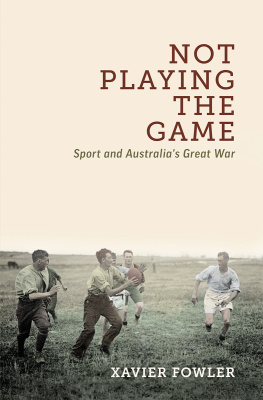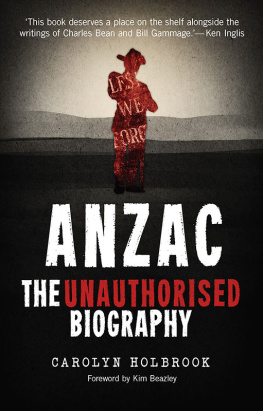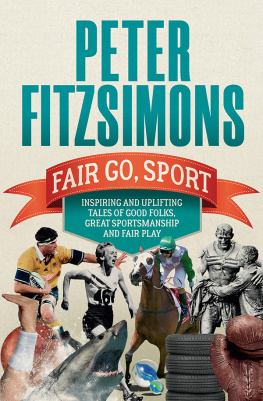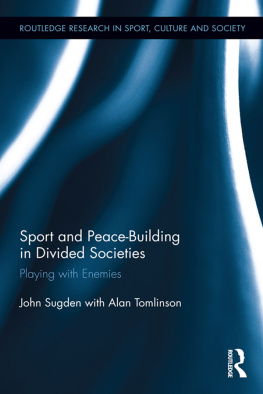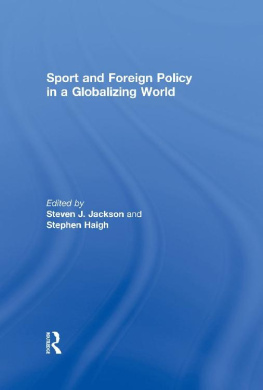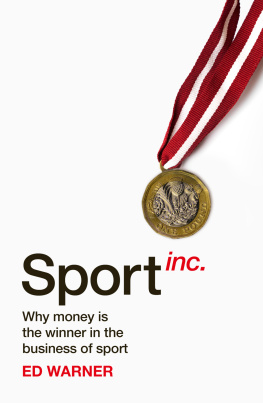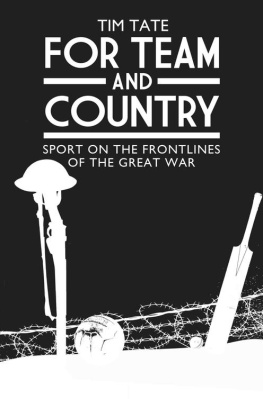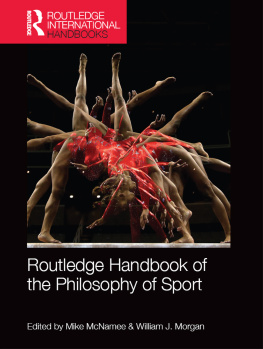Table of Contents
Not Playing the Game
Sport and Australias Great War
Xavier Fowler

MELBOURNE UNIVERSITY PRESS
An imprint of Melbourne University Publishing Limited
Level 1, 715 Swanston Street, Carlton, Victoria 3053, Australia
mup-contact@unimelb.edu.au
www.mup.com.au

First published 2021
Text Xavier Fowler, 2021
Design and typography Melbourne University Publishing Limited, 2021
This book is copyright. Apart from any use permitted under the Copyright Act 1968 and subsequent amendments, no part may be reproduced, stored in a retrieval system or transmitted by any means or process whatsoever without the prior written permission of the publishers.
Every attempt has been made to locate the copyright holders for material quoted in this book. Any person or organisation that may have been overlooked or misattributed may contact the publisher.
Text design and typesetting by J & M Typesetting
Cover design by Phil Campbell Design
Cover image: Teams from the 59th Battalion, Australian Army playing rugby during a brief rest from fighting at Barleux in France. Imperial War Museum E(AUS) 3355
Printed in Australia by McPhersons Printing Group

9780522877700 (paperback)
9780522877717 (ebook)
Here in New South Wales and probably in all Australia we have the liquor trade against us; we also have the Irish Catholics with few exceptions; we have the trade Unions, very largely; and we are making bitter enemies of the Sporting fraternity
Sir Joseph Carruthers, 1918
Contents
Acknowledgements
The original thesis upon which this book is based ran almost one hundred years parallel to the length of the war itself. I first walked into my assigned desk in the attic of the Old Arts building of the University of Melbourne in August 2014 and completed my submission just weeks before the centenary of the 11 November armistice. It would take a further three years to mould the thesis into a book worthy of publication, this time against the backdrop of a global pandemic that is sadly mirroring the Spanish influenza, also one hundred years ago. Through this seven-year journey I found assistance from a number of willing helpers, and each deserves recognition for their part in this humble endeavour.
First and foremost, I must extend my heartfelt thanks to Melbourne University Professor Joy Damousi. Joys insightful and constructive advice has only been surpassed by her eternal warmth and enthusiasm. I am forever indebted to Joy, as well as the projects co-supervisor Sean Scalmer. There are many other academics who have provided sound feedback and an assuring word or two when needed. Thank you to Tony Ward, Martin Crotty, Dale Blair, Robb Hess, Kevin Blackburn, Peter Stanley and Ian Syson. A special thank-you must be reserved for Bart Ziino. Thanks to the team at Melbourne University Publishing, particularly Nathan Hollier and Catherine McInnis for taking a chance on me and making my dream come true. Thanks also to Lyn Yeowart, for early proof reads, and copyeditor Vesna Rapajic.
There have been numerous individuals across many institutions who have helped in locating the mountain of evidence needed to build this book, and I am indebted to all of them. To the staff at the National Archives of Australia, National Library of Australia, Australian War Memorial, Victorian and NSW State Libraries, Melbourne University Archives, the Australian Racing Museum, RSL Victoria, Victorian Racing Club, the Melbourne Cricket Club, Cricket Victoria, the Australian Football League, Wesley College, Geelong Grammar, and Xavier College. Special thanks to Paul Mishura at Scotch College, for helping get me started.
Finally, I would like to thank those special souls in my personal life. Thank you to St Marys and Queens Colleges, for providing me with a home and an engaged community to work out of. Thank you to my family and friends for reminding me there is a life outside sport and war. To Prudence, thank you for your eternal love, support, and for dragging me to bed when I otherwise would have spent all night at the computer. And finally, to mum and dad, thanks for everything. I would have never been able to do this without you.
Illustrations
Tables
Introduction
Sport and war put on a wonderful show in Australia. Led by the Australian Football League (AFL), the professional sporting community hosts a series of dazzling commemorative matches each Anzac Day. One particular fixture, the Anzac Day eve blockbuster, provides a particularly awe-inspiring spectacle. The eternal flame at the Shrine of Remembrance lights a torch, carried by a Creswick Light Horse Trooper, into the Melbourne Cricket Ground (MCG) before the match. After a lap of the ground, the torch ignites a cauldron located in the grandstands, which burns for the duration of the contest. The crowd is encouraged to participate in the special occasion. Fifty thousand finger lights are distributed and held aloft in silence as the countdown to the game begins. The intended effect of these theatrics, according to Brendan Gale, CEO of the Richmond Football Club, is to reimagine some of the dark elements of the 1915 Gallipoli military landings, when the Anzacs would have been crossing the Dardanelles in darkness.
It is not all light shows and corporate functions, however. Anzac sporting fixtures are designed to honour the sacrifices of Australian service personnel throughout history, as well as the triumphant national legend they helped to forge. The playing of the Last Post and the silence of 90,000 fans crammed into the MCG on Anzac Day is a moving experience for anyone who has witnessed it. The stars of these contests, aside from the soldiers, of course, appear to cherish the meaning behind the occasion. Writing before the 1997 Anzac Day clash, James Hird, captain of the Essendon Football Club, remarked upon the significant contribution the Anzacs made to the nation, They fought for Australia and what it stood for and for the right of Australians to make decisions about how their country would develop. The power of this sport and war paradigm is not constrained to any one moment or place. Australian representative teams travel long distances to honour battle sites etched in national folklore. In 2001, the Australian mens cricket team participated in a pilgrimage to the trenches of Gallipoli. While there, the team was photographed wearing Anzac-styled slouch hats and war medals. This was followed by the re-creation of Charles Beans famous photo of Australian soldiers playing cricket at Gallipoli (Figure 1).

Figure 1 A game of cricket on Shell Green, Gallipoli, 1915.
The players appeared overwhelmed by the emotional significance of the trip. Some described it as life-changing and others were brought to tears.
Despite the positivity of this sentimental nationalism, there has been growing apprehension that corporatised sport has appropriated the Anzac legend for its commercial and public relations value.

